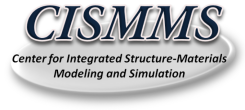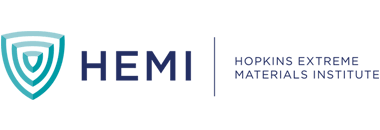The conference will be held at Hodson Hall on the campus of Johns Hopkins University (download map).. The following is an UPDATED PRELIMINARY PROGRAM. (updated 1/9/2019)
|
Day 1: Thursday, 17 January 2019 |
|
|
7:30 – 8:00 |
Registration & Breakfast - Hodson Hall 210 |
|
8:00 – 8:15 |
Opening Remarks – Michael Shields, Lori Graham-Brady, Somnath Ghosh, Michael Falk HEMI Introduction – KT Ramesh |
|
Session 1: Stochastic Modeling of Materials – Methodology Chair: Vissarion Papadopoulos, National Technical University of Athens Room: Hodson Hall 210 |
|
|
8:15 – 8:40 |
A Tour of Stochastic Modeling for Materials Science and Multiscale Analysis Johann Guilleminot – Duke University |
|
8:40 – 9:05 |
Reflections on the Use of Monte Carlo Simulation in Stochastic Mechanics George Deodatis – Columbia University |
|
9:05 – 9:30 |
Tensor Random Fields in Continuum Mechanics Martin Ostoja-Starzewski – University of Illinois |
|
9:30 – 9:55 |
Optimal Uncertainty Quantification with Focus on Material Uncertainty Michael Ortiz – California Institute of Technology |
|
9:55 – 10:15 |
Discussion |
|
10:15 – 10:30 |
Coffee Break & Posters - Hodson Hall |
|
Session 2: Stochastic Modeling of Materials – Material Failure Chair: Ernest Chin, Army Reserach Lab Room: Hodson Hall 210 |
|
|
10:30 – 10:55 |
Stochastic modeling of damage localization in quasibrittle materials Jia-Liang Le – University of Minnesota |
|
10:55 – 11:20 |
Stochastic non-local lattice particle method for voxel level uncertainty quantification and material failure analysis Yongming Liu – Arizona State University |
|
11:20 – 11:45 |
Stochastic Damage Mechanics: Developments and Recent Progress Jie Li - Tongji University |
|
11:45 – 12:10 |
Estimates of extreme material responses for random microstructures Mircea Grigoriu – Cornell University |
|
12:10 – 12:30 |
Discussion |
|
12:30 – 1:30 |
Lunch - Hodson Hall |
|
Session 3: Data-Driven Modeling and Machine Learning Chair: Fariba Fahroo, Air Force Office of Scientific Reseach Room: Hodson Hall 210 |
|
|
1:30 – 1:55 |
Data-Driven Model Reduction and Probabilistic Learning for Digital Twins Charbel Farhat – Stanford University |
|
1:55 – 2:20 |
Optimal Bayesian experimental design: methodologies and materials applications Youssef Marzouk – Massachusetts Institute of Technology |
|
2:20 – 2:45 |
Sparse regularization for learning high-dimensional functions Clayton Webster – Oak Ridge National Laboratory |
|
2:45 – 3:10 |
Endowing Deep Neural Networks with Uncertainty Quantification George Karniadakis – Brown University |
|
3:10 – 3:30 |
Discussion |
|
3:30 – 3:45 |
Coffee Break & Posters - Hodson Hall |
|
Session 4: Design and Optimization for Materials Chair: James Warner, National Aeronautics and Space Administration Room: Hodson Hall 210 |
|
|
3:45 – 4:10 |
Design of New Materials and Structures to Maximize Strength at Probability Tail: A Neglected Challenge for Quasibrittle and Biomimetic Materials Zdenek Bazant – Northwestern University |
|
4:10 – 4:35 |
Rational Design of Interatomic Potentials through Multi-Objective Optimization Simon Phillpot – University of Florida |
|
4:35 – 5:00 |
An Adaptive Reduced Basis Approach for PDE Constrained Optimization under Uncertainty Wilkins Aquino – Duke University |
|
5:00 – 5:25 |
Optimization under uncertainty for predicting properties and performance Jim Stewart – Sandia National Laboratory |
|
5:25 – 5:45 |
Discussion |
|
5:45 – 6:00 |
Speed Poster Slam - Hodson Hall 210 |
|
6:00 – 6:30 |
Break |
|
6:30 |
Depart for Dinner - Bus Departure (locations TBA) |
|
7:00 – 10:00 |
Dinner – 13thFloor Belvedere |
|
Day 2: Friday, 18 January 2019 |
|
|
8:00 - 8:30 |
Registration & Breakfast - Hodson Hall 210 |
|
Session 5: Multiscale Material Modeling – Microstructure Chair: Michael Falk, Johns Hopkins University Room: Hodson Hall 210 |
|
|
8:30 - 8:55 |
The Fundamental Challenges to Uncertainty Quantification of Atomistic-scale Materials Simulations Stephen Foiles – Sandia National Laboratory |
|
8:55 - 9:20 |
Predictive Multiscale Modelling of Materials Chemomechanics James Kermode - University of Warwick |
|
9:20 - 9:45 |
Role of Uncertainty Quantification in Embedded Scale-Bridging Materials Simulations Tmothy Germann - Los Alamos National Laboratory |
|
9:45 – 10:00 |
Discussion |
|
10:00 – 10:15 |
Coffee Break & Posters - Hodson Hall |
|
Session 6: Multiscale Material Modeling – Multiscaling Chair: Somnath Ghosh, Johns Hopkins University Room: Hodson Hall 210 |
|
|
10:15 – 10:40 |
Multiscale and Multidimensional Uncertainty Quantification in Integrated Computational Materials Engineering Wei Chen – Northwestern University |
|
10:40 – 11:05 |
Accelerating Scale Bridging via Surrogate Modeling Jaroslaw Knap – Army Research Laboratory |
|
11:05 – 11:30 |
Uncertainty in the Definition and Calibration of Multiscale Material Models David McDowell – Georgia Institute of Technology |
|
11:30 – 11:55 |
Homogenization Estimates for the Macroscopic Response and Field Statistics in Viscoplastic Polycrystals Pedro Ponte Castaneda - University of Pennsylvania |
|
11:55 – 12:15 |
Discussion |
|
12:15 – 1:15 |
Lunch - Hodson Hall |
|
Session 7: Multiscale Material Modeling – Macroscale Chair: Sanjay Govindjee, University of California, Berkeley Room: Hodson Hall 210 |
|
|
1:15 – 1:40 |
Multi-scale multi-physics uncertainty quantification of manufacturing effects on material performance Sankaran Mahadevan – Vanderbilt University |
|
1:40 – 2:05 |
Calibration and uncertainty analysis for a temperature-dependent yield strength model of additively manufactured Alloy 718Plus John McFarland – Southwest Research Institute |
|
2:05 – 2:30 |
Sensitivity Analysis for Multi-Scale Modeling to Inform Design Optimization Stephanie Termaath |
|
2:30 – 2:45 |
Discussion |
|
2:45 - 3:00 |
Coffee Break & Posters - Hodson Hall |
|
Closing Session Chair: Michael Shields, John Hopkins University Room: Hodson Hall 210 |
|
|
3:00 - 3:15 |
NSF NHERI SimCenter Sanjay Govindjee – University of California at Berkeley |
|
3:14 - 4:00 |
Closing Discussion – Primary Challenges and Future Directions |

